- Home
- Lemony Snicket
When Did You See Her Last? Page 2
When Did You See Her Last? Read online
Page 2
“Mr. and Mrs. Knight are in no state for visitors,” he said. “Zada or Zora, please take them away so I can attend to my patients.”
“Yes, Dr. Flammarion,” one of the aproned women said with a little bow, and motioned us out of the room. I looked back and saw Dr. Flammarion drawing a long needle out of his pocket, the kind of needle doctors like to stick you with. I recognized the smell and hurried to follow the others out of the room. We made our way through a skinny hallway made skinnier by rows of boxes, and then suddenly we were in a kitchen that made me feel much better. It was not dark. The sunlight streamed in through some big, clean windows. It smelled of cinnamon, a much better scent than what I had been smelling, and either Zada or Zora hurried to the oven and pulled out a tray of cinnamon rolls that made me ache for a proper breakfast. One of the aproned women put one on a plate for me while it was still steaming. Anyone who gives you a cinnamon roll fresh from the oven is a friend for life.
“What’s wrong with the Knights?” I asked after I had thanked them. “Why are they acting so strangely?”
“They must be in shock from their daughter’s disappearance,” Theodora said. “People sometimes act very strangely when something terrible has happened.”
One of the aproned women handed Theodora a cinnamon roll and shook her head. “They’ve been like this for quite some time,” she said. “Dr. Flammarion has been serving as their private apothecary for a few weeks now.”
“What does that mean?” I asked.
“Flammarion is a tall pink bird,” Theodora said.
“An apothecary,” continued the woman, more helpfully, “is something like a doctor and something like a pharmacist. For years Dr. Flammarion worked at the Colophon Clinic, just outside town, before coming here to treat the Knights. He’s been using a special medicine, but they just keep getting worse.”
“That must have been very upsetting for Miss Knight,” I said.
Zada and Zora looked very sad. “It made Miss Knight very lonely,” one of them said. “It is a lonely feeling when someone you care about becomes a stranger.”
“So Miss Knight has no one caring for her,” Theodora said thoughtfully. The cinnamon rolls were the sort that is all curled up like a snail in its shell, and my chaperone had unraveled the roll before starting to eat it, so both of her hands were covered in icing and cinnamon. It was the wrong way to do it. She was also wrong about no one caring for Miss Knight. Zada and Zora were the ones who were beside themselves with worry. I leaned forward and looked first at Zada and then at Zora, or perhaps the other way around. And then, while my chaperone licked her fingers, I asked the question that is printed on the cover of this book.
It was the wrong question, both when I asked it and later, when I asked the question to a man wrapped in bandages. The right question in this case was “Why was she wearing an article of clothing she did not own?” but this is not an account of times when I asked the right questions, much as I wish it were.
“Miss Knight was with us yesterday morning,” one of the women said, using her apron to dab at her eyes. “She was sitting right where you are sitting now, having her usual breakfast of Schoenberg Cereal. Then she spent some time in her room before going out to meet a friend.”
“Who was this friend?” I asked.
“She didn’t say. She just drove off, and she hasn’t come back.”
“She’s old enough to drive?”
“Yes, she got her license a few months ago, and her parents bought her a shiny new Dilemma.”
“That’s a nice automobile,” I said. The Dilemma was one of the fanciest automobiles manufactured. It was claimed that you could drive a Dilemma through the wall of a building and emerge without a dent or scratch, although the building might collapse.
“Mr. and Mrs. Knight give their daughter whatever she wants,” the aproned woman said. “New clothes, a new car, and all sorts of equipment for her experiments.”
“Experiments?”
“Miss Knight is a brilliant chemist,” Zada or Zora said proudly. “She often stays up all night working on experiments in her bedroom.”
“I imagine she learned that from watching you cook,” I said. “This cinnamon roll is the best I have ever tasted.”
Complimenting someone in an exaggerated way is known as flattery, and flattery will generally get you anything you want, but Zada and Zora were too worried to offer me a second pastry. “She probably inherited her abilities from her grandmother,” the woman said. “Ingrid Nummet Knight founded Ink Inc. when she was a young scientist, after years of experimenting with many different inks from many different creatures. Before long Ink Inc. made the Knights the wealthiest family in town. But those days are over. Ink Inc. is almost finished, and so is the town. That’s why we’re leaving Stain’d-by-the-Sea.”
“When are you leaving?” I asked.
“Whenever the Knights give the word.”
“Even if Miss Knight doesn’t come back?”
“What can we do?” asked the other woman sadly. “We’re only the servants.”
“Then make me some tea,” said an eager voice from the doorway. The bright kitchen seemed to grow darker as Dr. Flammarion strolled into the room, took a cinnamon roll without asking, and sat down loudly.
“We were talking about Miss Knight,” one woman said quietly.
“Very worrisome,” the apothecary agreed, with his mouth full. “But at least her parents are resting comfortably. They were shocked to hear of the disappearance. I gave them an extra injection of medicine so that they might pass the afternoon in a comfortable state of unhurried delirium.”
“What medicine is it, Doctor?” I asked.
Dr. Flammarion frowned at me. “You’re a curious young man,” he said.
“I’m sorry, Dr. Flammarion,” Theodora said. She had finished her cinnamon roll and was wiping her fingers on the photograph of the missing girl. “My apprentice has forgotten his manners.”
“It’s quite all right,” Dr. Flammarion said. “Curiosity tends to get little boys into trouble, but he’ll learn that soon enough for himself.” He offered me his nasty smile like a bad gift, and then said quickly, “The medicine I gave them is called Beekabackabooka.”
I have never been to medical school and am never quite sure how to spell the word “aspirin,” but I still knew that Beekabackabooka is not a medicine of any kind. It didn’t matter. Even without his revealing himself to be a liar, I knew there was something suspicious about Dr. Flammarion, and even without his telling me, I knew the medicine he was giving the Knights was laudanum. I recognized the smell from an incident some weeks earlier, when people had tried to sneak some into my tea. This incident is described in my account of the first wrong question, on the rare chance you have access to, or interest in, such a report.
“It must be difficult to care for Mr. and Mrs. Knight all by yourself,” I said, and looked him in the eye. He blinked behind his glasses, and his beard tried harder to flee from his nasty smile.
“I’m not quite all by myself, young man,” he told me. “I have a nurse who is good with a knife.”
Theodora stood up. “I want to conduct a thorough search of the scene of the crime,” she said.
“What crime?” Dr. Flammarion said.
“What scene?” I asked.
“It seems likely a terrible crime has been committed,” Theodora said firmly, with no thought to how much that would upset the two women who cared for Miss Knight.
“As the Knight family’s private apothecary, I must say that I’m not sure a crime has been committed at all. Miss Knight likely just ran away, as young girls often do.”
The two servants looked at each other in frustration. “She wouldn’t have run away,” one of them said, “not without leaving a note.”
“Who knows what a wealthy young girl will do?” Dr. Flammarion said with a smooth shrug. “In any case, I told Zada it was not worth alarming the police.”
“Zora,” she corrected him sharply.
“I’m sorry, Zora,” Dr. Flammarion said with a little bow that indicated he was not sorry at all.
“I’m Zada,” she corrected him again, “but it’s true. Dr. Flammarion stopped Zora from calling the police and suggested we call you instead.”
“The good doctor made a good choice,” Theodora said in a tone of voice she probably thought was reassuring, and then stood up and made a dramatic gesture. “Nevertheless, I would like to search the place Miss Knight was last seen. Take me to her bedroom!”
There was no arguing with S. Theodora Markson when she began to gesture dramatically, so I followed my chaperone as she followed Zada and Zora through the packed-up house, with Dr. Flammarion close behind me, his breath as unpleasant as the rest of him. Soon we were in a room I recognized from the photograph, which Theodora put down on a brand-new desk in order to rifle through the clothing in the closet. There was no sense in it. This was not the place Miss Knight was last seen. It was simply the place Zada and Zora had seen her last. The girl had driven off in a fancy automobile. It was likely someone else had seen her afterward.
“This room isn’t packed up,” I said.
“Miss Knight wants to do it herself,” one of the women said, “but she hasn’t packed up anything but a few items of clothing.”
That made me ask a question that was closer to the right question than I knew. “What was she wearing when she left?”
Zada or Zora pointed to the photograph. “See for yourself,” she said. “We took that photograph yesterday morning, at her request. It was a lucky thing. Now that photograph is all over town.”
I looked at the picture again. Nothing seemed familiar, but the pink hat looked out of place. “That’s an unusual cap,” I said. “Do you know where she got it?”
“Snicket,” Theodora said sternly. “A young man should not take an interest in fashion. We have a crime to solve.”
Dr. Flammarion smiled at me again, and I looked down at the desk rather than look at either my chaperone or this suspicious doctor. In the middle of the tidy desk was a plain white sheet of paper with nothing on it. No, Snicket, I thought. That’s not right. Here and there were tiny indentations, as if something had scratched at it. I leaned down to the desk and inhaled, and for the second time since I entered the tall pen-shaped tower, I smelled a familiar scent, or really two familiar scents mixed together. The first was the scent of the sea, a strong and briny smell that still came from the seaweed of the Clusterous Forest when the wind was blowing in the direction of Stain’d-by-the-Sea. The second scent took me a moment to identify. It smelled in a certain way that was on the tip of my tongue until I breathed it in one more time.
“Lemony,” I said, but I was not saying my name out loud. I took the piece of paper over to the bed stand, turned on the reading light, and waited a minute or two for the lightbulb to get good and hot. While I waited I looked around the room, and it occurred to me that Zada and Zora were wrong. The Knight girl had started packing. She often stayed up all night in her bedroom working on scientific experiments, but there was not one piece of scientific equipment to be seen. At last the bulb was warm enough.
There are three things to know about invisible ink. The first is that most recipes for it involve lemon juice. The second is that the invisible ink becomes visible when the paper is exposed to something hot, such as a candle or a lightbulb that has been on for a few minutes. I held the paper up, very close to the lightbulb, and watched. Zada and Zora saw what I was doing and walked over to get a look. Dr. Flammarion also stepped closer. Only Theodora did not watch the paper as it warmed up, and instead took a blouse from the closet and held it up to her own body to look at herself in the mirror.
No matter how many slow and complicated mysteries I encounter in my life, I still hope that one day a slow and complicated mystery will be solved quickly and simply. An associate of mine calls this feeling “the triumph of hope over experience,” which simply means that it’s never going to happen, and that is what happened then. The third thing to know about invisible ink is that it hardly ever works. After several minutes of exposing the paper to heat, I looked at it and read what it had to say:
In other words, nothing. But the curious thing was that the nothingness was finally a clue I could use.
CHAPTER THREE
“This is a fortunate day,” Theodora said to me. With one gloved hand she was steering the green roadster back toward the Lost Arms, and with her other glove she was tapping me firmly on the knee. Nobody likes to be tapped on the knee. Practically nobody likes to be tapped anywhere. She kept doing it. “ ‘Fortunate’ is a word which here means fortuitous, and it’s particularly fortuitous for you. It’s auspicious. It’s opportune. It’s kismet. It’s as lucky as can be. Lucky you, Snicket! With this new case, I will reveal my routine and my methods for skip tracing.”
Outside it looked like it might rain again. Inside I had the photograph of the girl in my lap. The promising young chemist looked even more annoyed, perhaps because Theodora had left sugary fingerprints all over the picture. “What shall we do first?” I asked.
“Don’t talk, Snicket,” Theodora said. “Fools talk while wise people listen, so listen up and I’ll tell you how we will solve this case sensibly and properly. We will do six things, and for each thing, I will hold up a finger of my hand, so at the end I will be holding up six fingers and you will not be confused.”
I stopped listening, of course. Theodora’s sensible and proper methods of solving our previous case had led to our dangling unnecessarily from a hawser, which is a cable suspended up in the air, not a sensible or proper thing to do. I nodded solemnly at thing number one, and when she lifted a second gloved finger, I stared out the window and thought. It was surprising to me that so much of the mystery had been solved already. Dr. Flammarion was giving Ignatius and Doretta Knight heavy doses of laudanum with his hypodermic needle, leaving them mumbling and half conscious. It was not difficult to think of reasons why an apothecary would want to control the wealthiest family in town, even if they were not as wealthy as they once had been and the town was fading away to nothing. But Dr. Flammarion would have a more difficult time with a promising young chemist, who would know all about laudanum and its sleepy, dangerous ways. And so she had vanished.
The part of the story that confused me was the note. Zada and Zora had insisted that Miss Knight would have left a note if she had run away, but Dr. Flammarion had said there was no note. But I had found a sort of half note—a message written in invisible ink that hadn’t worked. Miss Knight was a chemist. She would know that invisible ink hardly ever works. She also seemed to like brand-new clothes but was wearing an old hat in the picture. There’s a connection, my brain said to me, between the hat and the disappearance, but I told my brain that if there was a connection, it had to think of it itself, because my eyes had spotted a bigger clue on the street outside.
“Stop the car,” I said.
“Be sensible,” Theodora said. “I haven’t even gotten to thing number four.”
“Stop the car, please.”
She stopped the car, perhaps because I had said “please.” I stepped out onto the curb of a quiet street, although practically all of the streets in Stain’d-by-the-Sea were quiet. They were so quiet that if you drove through them on a regular basis, you would notice anything new, such as the flyers of Miss Knight printed with the word MISSING. You would also notice an enormous automobile, particularly if it was one of the fanciest automobiles manufactured.
I was standing in front of a Dilemma. There are people in the world who care about automobiles, and there are people who couldn’t care less, and then there are the people who are impressed by the Dilemma, and those people are everyone. The Dilemma is such a tremendous thing to look at that I stared at it for a good ten seconds before reminding myself that I should think of it as a clue to a mystery rather than as a wonder of modern engineering. It was one of the newer models, with a small, old-fashioned horn perched just outside each
front window, and a shiny crank on the side so you could roll down the roof if Stain’d-by-the-Sea ever offered pleasant weather, and it was the color of someone buying you an ice cream cone for no reason at all.
Theodora had gotten out of the roadster and stared at the Dilemma for as long as I had. “You should be ashamed of yourself, Snicket,” she said, when she had remembered to be a chaperone. “You’re supposed to be looking for Miss Knight, not getting distracted by automobiles, no matter how beautiful they are and how interesting to behold and no matter how long you want to stand here staring at it because it’s very beautiful and interesting to behold and so you find yourself staring at it for quite some time because it is so beautiful and interesting—”
“This car probably belongs to Miss Knight,” I said before she could continue. “Not many people can afford a new Dilemma.”
“Then she must be nearby,” Theodora said, turning quickly all the way around to look in every direction down the empty street.
“I read once,” I said, “about a person who parked their car and then went someplace else.”
“Don’t be impertinent.” Theodora frowned. “Where could she have gone?”
I looked down the block. “Impertinent” is a word which actually means “not suitable to the circumstances,” but most people use it to mean “I am using a complicated word in the hopes that it will make you stop talking,” so I merely pointed at the only remaining grocery store in town.
Partial Foods must have once been a grand grocery store. It was not a grand grocery store for the duration of my stay in Stain’d-by-the-Sea. It looked like a grand grocery store that someone had thrown down the stairs. To enter the store, you walked through a pair of enormous glass doors with brass handles carved with images of fresh fruit and vegetables, but the doors were badly cracked and difficult to open. There were wide shelves and deep bins ready to hold enormous mountains of delicious food, but at least half of them were empty, and the rest held food that was unripe or stale, mushy or brittle, bruised or encased in too many layers of plastic, or something I didn’t like. The place was almost enormous and almost deserted, so it took some time wandering through the big, meager aisles until we found someone to talk to. The owner of Partial Foods was a woman who could look both very angry and very bored at the same time and in fact was doing so when we found her. On a stained smock, she was wearing a peeled name tag that read POLLY PARTIAL.

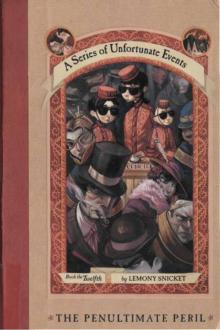 The Penultimate Peril
The Penultimate Peril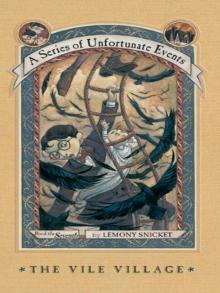 The Vile Village
The Vile Village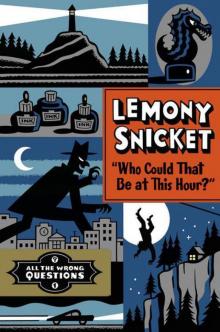 Who Could That Be at This Hour?
Who Could That Be at This Hour?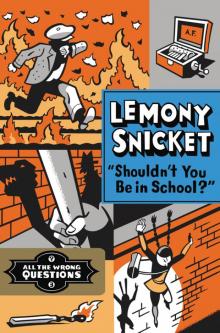 Shouldn't You Be in School?
Shouldn't You Be in School?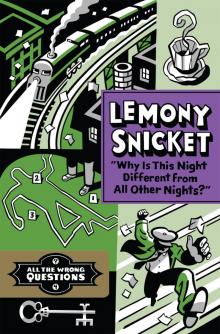 Why Is This Night Different From All Other Nights?
Why Is This Night Different From All Other Nights?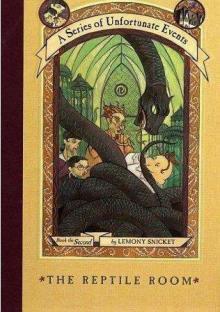 The Reptile Room
The Reptile Room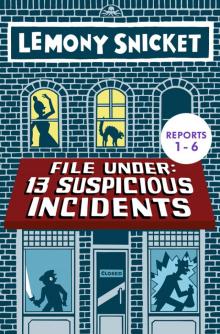 File Under: 13 Suspicious Incidents (1-6)
File Under: 13 Suspicious Incidents (1-6) The End
The End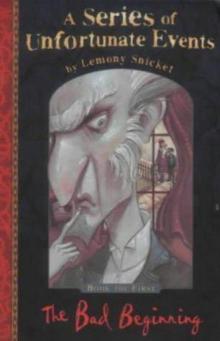 The Bad Beginning
The Bad Beginning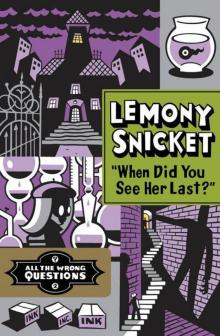 When Did You See Her Last?
When Did You See Her Last?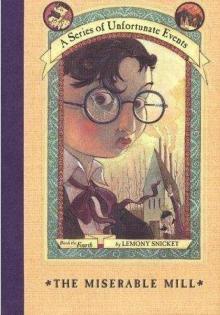 The Miserable Mill
The Miserable Mill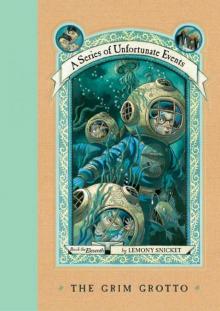 The Grim Grotto
The Grim Grotto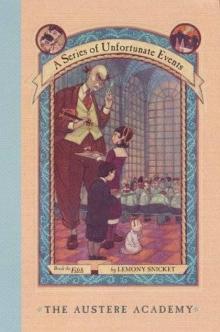 The Austere Academy
The Austere Academy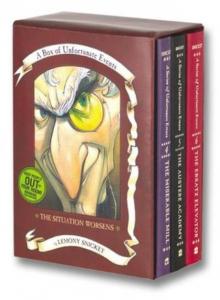 The Ersatz Elevator
The Ersatz Elevator The Wide Window
The Wide Window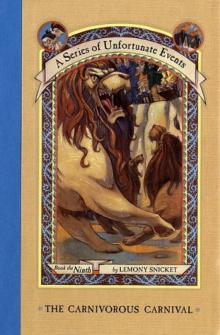 The Carnivorous Carnival
The Carnivorous Carnival A Series of Unfortunate Events Box: The Complete Wreck
A Series of Unfortunate Events Box: The Complete Wreck The Slippery Slope
The Slippery Slope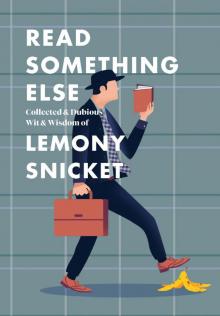 Read Something Else
Read Something Else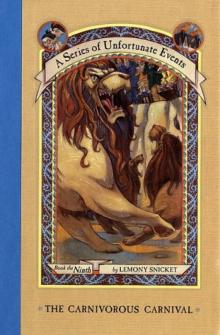 The Carnivorous Carnival asoue-9
The Carnivorous Carnival asoue-9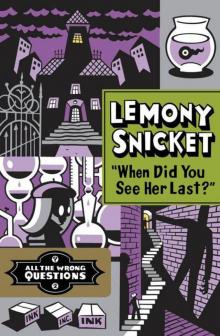 When Did You See Her Last
When Did You See Her Last The Slippery Slope asoue-10
The Slippery Slope asoue-10 The Hostile Hospital asoue-8
The Hostile Hospital asoue-8 A Series of Unfortunate Events Collection: Books 1-13 with Bonus Material
A Series of Unfortunate Events Collection: Books 1-13 with Bonus Material The End asoue-13
The End asoue-13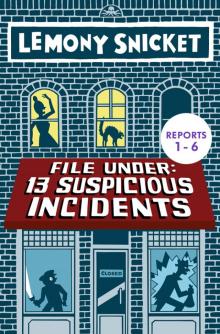 File Under
File Under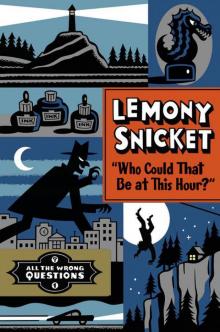 Who Could That Be at This Hour? (All the Wrong Questions)
Who Could That Be at This Hour? (All the Wrong Questions)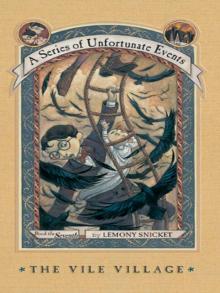 The Vile Village asoue-7
The Vile Village asoue-7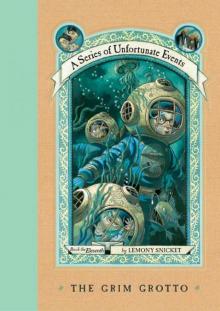 The Grim Grotto asoue-11
The Grim Grotto asoue-11